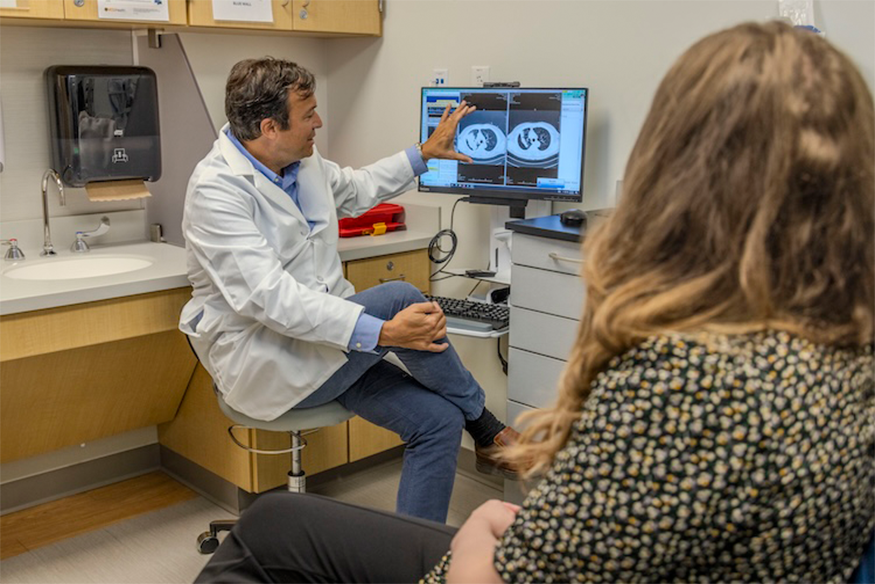Latest News
Research, Clinical
Becoming a destination for clinical research
May 23, 2025
 Physician-researchers, like Renato Martins, M.D., M.P.H., of VCU Massey Comprehensive Cancer Center, work with patients during clinical trials
Physician-researchers, like Renato Martins, M.D., M.P.H., of VCU Massey Comprehensive Cancer Center, work with patients during clinical trials
The roles of clinicians and researchers are intertwined. Clinicians rely on clinical research to provide leading-edge care for patients today, tomorrow and in the future.
Patrick Nana-Sinkam, M.D., knew during his fellowship that he wanted to do both.
“I'd always been very interested in trying to better identify the underlying drivers of disease. And most importantly, how I could improve a patient's outcome,” he said. “I quickly realized pursuing a career pathway as both a clinician and researcher would allow me to ask and answer some important questions.”
Years beyond his fellowship in pulmonary and critical care at the University of Colorado and National Jewish Health, Nana-Sinkam is masterfully balancing his role as the associate vice president of clinical and translational research at VCU Health.
In this role, he leads a team to provide guidance to researchers working on clinical trials, oversee research finance operations and partner with institutes and centers across the health system and university to ensure that clinical studies are effectively implemented. Meanwhile, he also serves as a pulmonologist, the Linda Grandis Blatt Endowed Chair in Cancer Research and a member of the Cancer Prevention and Control research program at VCU Massey Comprehensive Cancer Center.
Last year, Virginia Commonwealth University and VCU Health enrolled more than 2,000 patients in clinical trials representing everything from the newest drugs for cancer and cardiovascular diseases to gene therapies for sickle cell disease. This includes 317 patients enrolled on interventional treatment trials at Massey, a record enrollment in treatment clinical trials at the cancer center during a single year.
“At any given time, we have nearly 500 clinical trials [across VCU and VCU Health], so we are very active,” Nana-Sinkam said. “In fact, when we look between 2023 and 2024, we had about an 80% increase in the number of patients who were enrolled in interventional clinical trials.”
Nana-Sinkam is currently involved in the implementation of the national Vanguard Study, through which randomized patients will receive one blood test to determine if it is reliable and effective in the early detection of multiple forms of cancer.
While cancer screening remains the most effective method of early detection, there are currently only five screenable cancers — breast, prostate, lung, colorectal and cervical cancer. The National Cancer Institute, part of the National Institutes of Health, established the Cancer Screening Research Network (CSRN) to understand the viability of emerging cancer screening technologies. Together, VCU, Inova and Sentara Health are one of nine national CSRN sites leading activation and enrollment for preventive care clinical trials in the region.
“VCU is the lead institution between the three partners,” said Nana-Sinkam. “We will be responsible over the next 18 to 24 months for enrolling about 2,000 Virginians, ages 45 to 75. At this point, we have yet to determine whether or not a blood test for cancer early detection is feasible in clinical practice across our various communities. The test is unique in that it can provide information as to whether or not a patient is at risk of having a cancer. It can also provide some indication of what type of cancer they may have. This represents our first attempt to determine if such a diagnostic test is feasible.”
 Patrick Nana-Sinkam, M.D., associate vice president of clinical and translational research at VCU Health and a pulmonologist at VCU Massey Comprehensive Cancer Center, provides guidance to researchers working on clinical trials, oversees research finance operations and partners with institutes and centers across the health system and university to ensure that clinical studies are effectively implemented. (Credit: VCU)
Patrick Nana-Sinkam, M.D., associate vice president of clinical and translational research at VCU Health and a pulmonologist at VCU Massey Comprehensive Cancer Center, provides guidance to researchers working on clinical trials, oversees research finance operations and partners with institutes and centers across the health system and university to ensure that clinical studies are effectively implemented. (Credit: VCU)
These types of research studies and clinical trials further our understanding of illnesses and disease, advancing medical practices. Without them, it becomes very difficult to develop new drugs or new diagnostic testing, and to implement new ways of actually treating and caring for patients.
“Clinical research is so important because this is really the avenue we have available to us to ultimately determine whether a new approach to clinical care — a new diagnostic test or a new drug — can actually improve the health in a patient and ultimately, in a community,” he said.
How cross-campus collaborations improve the health of patients
Within walking distance of VCU Medical Center in downtown Richmond, you will find an academic campus with premier health science schools, as well as Massey, the Children’s Hospital of Richmond at VCU, VCU Health Pauley Heart Center and VCU’s Stravitz-Sanyal Institute for Liver Disease and Metabolic Health. These represent just a few of the nationally recognized programs connected to the university-based health system.
“You have these great minds who can actually work as teams to try to untangle some of these real mysteries in medicine and determine the underpinnings of some of the most complex diseases,” Nana-Sinkam said. “Collaborating across disciplines enables us to benefit by bringing together teams with diverse expertise and perspectives.”
Clinical research is built on programs and centers of excellence focused in disease areas that most impact communities, such as cancer, addiction, and diseases of the heart, liver, lung and kidney.
“Patient-centered clinical care sits at the core of clinical research,” Nana-Sinkam said, adding that research helps position an academic or affiliated community-based medical facility as a recognized destination center that draws in more people seeking care. “When they know research is part of their care, they can benefit from leading-edge discovery.”
“As clinical research grows, we have to be nimble in how we engage our communities regarding clinical trial participation,” Nana-Sinkam added. “We cannot necessarily expect the community to always come to us. We have to bring research to the community where we have a responsibility to make sure all patients have an opportunity to partner with us in clinical studies. Toward that end, we are growing our partnerships with VCU Health Tappahannock Hospital and VCU Health Community Memorial Hospital.”
Some of the most meaningful research Nana-Sinkam has pursued as a pulmonologist was within a team including biomedical engineers, biostatisticians and bioinformatics experts. One project he works on with the Translational Lung Cancer Research Group (TLCaRG) integrates both genomic and proteomic platforms to discover new biomarkers that may be used in the diagnosis, treatment and surveillance of tobacco-related lung diseases.
The lab has an ongoing collaboration with nanoengineering to explore novel platforms for the non-invasive detection of circulating markers for lung cancer early detection.
“When I first set out to develop a blood-based test for lung cancer, I would never have anticipated that this cross-disciplinary collaboration could be so impactful,” he said.
Growth through investing in research and the future
Not only do patients seek out destination centers, but so do talented clinical researchers and trainees. Job creation generated by research can spur significant economic growth for communities, even leading to industry partnerships. A discovery that starts in the laboratory can eventually lead to significant expansion of a research workforce, a new drug or intervention that can, in turn, stimulate the local economy.
“By improving clinical care, you can reduce health care costs,” Nana-Sinkam said. “The potential to improve the standard of care in your community through clinical research will eventually lead to a reduction in health care costs.”
VCU has positioned itself to be a destination for cutting-edge discovery that translates to patient-centered care for an entire community.
“While we have made significant strides in treating patients who previously had limited options and have witnessed improved quality of care and outcomes, there remain many opportunities to solve other medical mysteries and improve the health of our entire community,” Nana-Sinkam said. “Clinical trials give us a chance to do that.”
This was repurposed from an article originally published by VCU Health.
Written by: Joan Tupponce
Related News
Clinical
Stay the course and live: Massey patient shares hope and gratitude through songAug 4, 2025
Clinical
From “less than two weeks to live” to cancer free: how a Massey clinical trial changed a lifeJul 28, 2025

Get access to new, innovative care
Treatments in clinical trials may be more effective or have fewer side effects than the treatments that are currently available. With more than 200 studies for multiple types of cancers and cancer prevention, Massey supports a wide array of clinical trials.

Find a provider
Massey supports hundreds of top cancer specialists serving the needs of our patients. Massey’s medical team provides a wealth of expertise in cancer diagnosis, treatment, prevention and symptom management.
